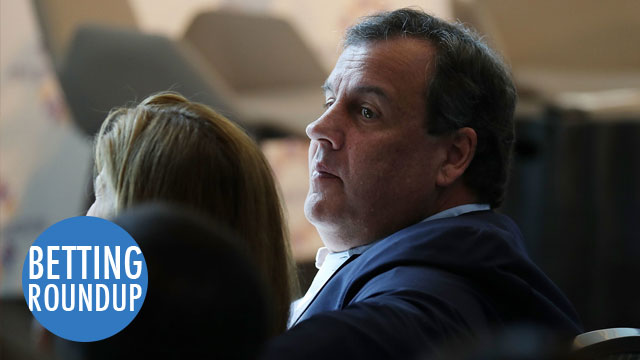Twice weekly, we’ll comb through as many articles, tweets and podcasts as we can find related to the world of sports betting and daily fantasy sports, and publish the good stuff here.
Stumble upon something you think we should include? Email info@bettingtalk.com.
* * *
New Jersey Governor Chris Christie said it’s possible that New Jersey could have legal sports betting before the end of the next NFL season.
The governor said that the Supreme Court need not formally legalize sports betting in New Jersey, but only needs say that the state could relax rules blocking it.
“If they say that states should make the decisions, New Jersey voters have already decided by a two-thirds vote that they want sports gambling, and so that’s what we’d do in our state,” said Christie.
The U.S. Supreme Court “may issue an oral argument before the end of June,” said the governor, leaving open the chance that New Jerseyans could bet on the forthcoming NFL season this fall.
“Certainly in time for the Super Bowl,” said Christie.
NFL, NBA, MLB and NHL player unions have met several times to discuss the potential of legalized sports betting.
The MMQB has learned that the four unions have had a number of formal meetings in New York over the past year-and-a-half to discuss the potential ramifications that legalized sports gambling could present for their players.
“Yes, the sports unions have been discussing the issue, in particular around the integrity of our respective games,” NFLPA executive George Atallah said Thursday afternoon. “We’re collaborating on it. We might be open to changes that are coming because of (legalized sports gambling), but before we get to the revenue aspect of it, do we have the infrastructure in place to prevent any sort of shenanigans? That’s the issue.”
Atallah said the unions have started looking at how legalized sports gambling and those associated issues are handled overseas in areas where it’s been legal for decades. They’re also monitoring legislation in New Jersey, which has been the primary battleground for legalized sports gambling.
A Los Angeles Times article looks at how the recent decision to legalize MVP betting could pave the way for bets on presidential elections and reality TV shows.
But he said there had been discussions among casino operators about seeking approval for betting on nonsports events, such as “American Idol” or the presidential election. He said that overseas the presidential election is a popular betting option, and he predicted if it were offered in Las Vegas, “it would be bigger than the Super Bowl.”
Nevada state Sen. Tick Segerblom, a Las Vegas Democrat, thought the same thing when he introduced a bill in 2015 seeking to lift the state’s ban on betting on federal elections. The bill stalled, but the senator said he planned to introduce it again when the Legislature meets in 2019.
“It’s good for Nevada, the betting capital of the world,” Segerblom said. “We have to offer what we can now. Soon every state is going to have betting, and we need to be in front of that. It’s a rapidly expanding industry.”
Gaming regulators remain squeamish about political betting, however, pointing to fears that the odds could influence voter turnout if the line moves for a candidate. But others argue that widespread opinion polling before an election can have a similar effect.
This week, the American Sports Betting Coalition launched a campaign to legalize and regulate sports betting.
The newly formed American Sports Betting Coalition supports a new approach. We believe giving states the power to decide whether to allow sports betting and how best to regulate it would offer many important public benefits.
First, an open, transparent, regulated betting market takes sports betting out of the shadows, making it easier for law enforcement to protect the public and choke off money flowing into criminal organizations.
Second, a regulated market combined with modern data analytics technology makes it easier to track sports wagering, identify suspicious and anomalous betting patterns and strengthen the integrity of games.
Third, lifting the ban would enable state policymakers to align the law with public opinion. A recent national survey by Greenberg Quinlan Rosner (GQR) found that ending the federal sports betting ban is one of the few issues that unites Democrats, Republicans and Independents. According to the survey, 57 percent of independents, 58 percent of Republicans and 52 percent of Democrats want to let states make the call. Among avid sports fans, support for ending the ban rises to 72 percent.
A new USA Today article suggests the NFL has been “consistently inconsistent” with its gambling policy.
On one side of the ballroom, the league still opposes sports gambling and is against promoting casinos. The NFL even continues to fight a lawsuit that seeks payback from the league after it banned Tony Romo and other players from an event at a Las Vegas casino property in 2015.
On the other side of the room, the league increasingly has flirted with the gambling industry in recent years, including allowing advertising from casinos. In Arizona, a casino company called Gila River Gaming Enterprises confirmed to USA TODAY Sports this month that it’s been having discussions with the Arizona Cardinals about buying naming rights to their stadium.
“This pertains to the stadium naming rights,” the casino company said before recently reaching non-disclosure agreement about it with the team. “This is a result of continued communications with the Arizona Cardinals through our strong existing relationship.”
The league’s current gambling policy still prohibits the sale of “primary stadium or field naming rights” to gambling-related establishments. So why is this even a possibility in Arizona? The bigger question many have asked recently is why the league maintains this conflicted policy, especially after approving the relocation of the Oakland Raiders to the gambling capital of Las Vegas.
